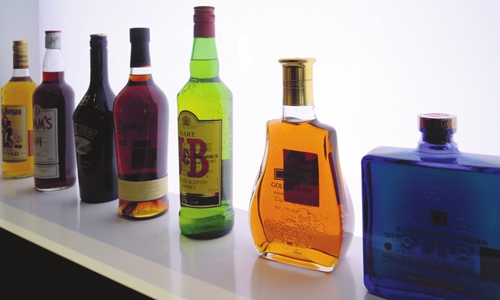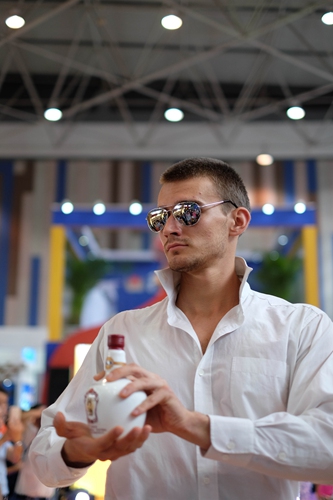HOME >> LIFE
New Jersey resort is a dry island, and proud of it
Source:AFP Published: 2020/1/16 15:43:40

Foreign alcohol on display at the Shanghai International Wine Fair in November 2017. Photo: CNSphoto

A model shows off a bottle of alcohol at an exhibition in Southwest China's Guizhou Province. Photo: CNSphoto
Pizza joints and popcorn stands jostle for attention all along the boardwalk in Ocean City, New Jersey - but good luck finding a drink. A full century after the Prohibition era began in the US, being dry has become a trademark for the beachside resort.In between ads for local churches, signs posted all along the Atlantic serve as a stern warning to anyone tempted to crack open a beer on the beach: "Alcoholic beverages prohibited. Strictly enforced. Fine $275."
Although Prohibition ended nationwide in 1933, the island of 11,000 residents is one of hundreds of US cities and jurisdictions that continue to ban alcohol sales.
Restaurant menus offer a choice of hot drinks, water and sodas, and - although as many as 150,000 people flood the resort during summer weekends - it doesn't have a single bar.
Founded in the late 19th century by Methodists who wanted to turn it into a Christian resort, Ocean City is what is known as a "dry town."
Alcohol production and sales have been outlawed there since 1909, a decade before Prohibition was ushered in nationwide on January 17, 1920.
A century later, very little has changed.
You can drink a glass of wine in the privacy of your own home, but to do so you need to trek to one of the large liquor stores strategically placed at the end of the bridges onto the island - often jammed with traffic during high season.
Tense referendum
Drinkers or not, residents have embraced their town's sobriety with a certain pride, particularly in comparison to less virtuous neighbors along the Jersey shore. The city's slogan is "America's greatest family resort."
The casinos and strip clubs of neighboring Atlantic City, a major hub for organized crime during Prohibition, are less than half an hour away by car.
Most of the surrounding beaches are filled with hordes of young partiers.
Eric Plyler, a graphic designer who spent his childhood vacations in Ocean City, created the "Dry Island" brand to celebrate its "most unique characteristic."
The design, drawing visual and verbal inspiration from the Prohibition era, is emblazoned on mugs, baseball caps and T-shirts filling the shelves of the 26-year-old's store on main street.
"People appreciate the fact that it being dry improves the value of life here, but it doesn't mean that they don't like alcohol," said the bearded young entrepreneur - himself a fan of craft beers.
"It just means that it's something that we can hold on to as a claim to fame."
So when a local business owner in 2012 gathered enough signatures to hold a referendum on whether customers could bring their own bottle of beer or wine into restaurants, some, like Drew Fasy, saw it as a threat to the city's image.
"If you have a successful brand, you don't mess with it. Nobody is gonna change McDonald's golden arches," said the former real estate agent. He is adamant about not letting Ocean City go the way of other Jersey shore towns, which are "built around alcohol," in his opinion.
'Gray area'
The 2012 BYOB ("bring your own bottle") referendum sharply divided the city. Opponents were accused of being religious zealots. Supporters of seeking to open the flood gates to debauchery.
Chris and Sharon Hoffmann, owners of the Captain Bob's restaurant, said they have been boycotted for calling for a little more flexibility when it comes to alcohol.
"It was a little nervewracking," recalled Sharon Hoffman.
"People would make reservations but not show up. We had people who smashed our flower pots, someone who sliced my tire. It was heated."
As it turned out, the "no" to BYOB won a comfortable two-thirds majority, but the couple has since found a way to work around local alcohol laws by privatizing their restaurant.
Patrons pay $10 per table to join the "Foodies Dinner Club" and are then able to bring their own bottle, as if they were going over to a friend's house to eat.
Approved by local authorities, the concept is catching on around the island - where high-end restaurants are almost nonexistent due to the fact owners are unable to offer alcoholic beverages along with meals.
"Why should I have to leave the island to get a good dinner?" lamented Chris Hoffmann.
That said neither he nor his wife would dream of pushing for alcohol to be legalized throughout the city.
"You have to respect the culture," he said.
Newspaper headline: Welcome to ocean city
Posted in: FOOD